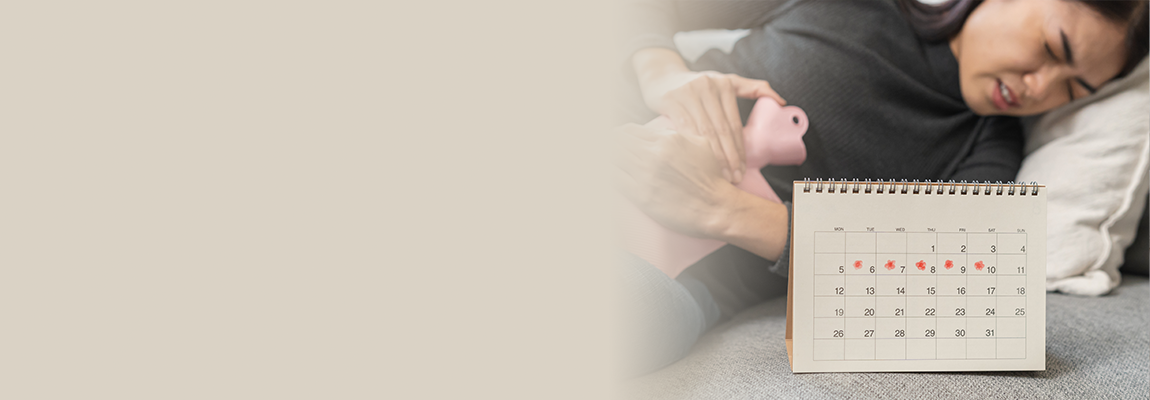
5 Common Causes of Irregular Periods
A regular menstrual cycle is one that happens every 28 days where your period occurs on the first day of the cycle – usually lasting up to 8 days. On the other hand, irregular periods are when the gaps between each cycle fall below 21 days or go beyond 35 days. Drastic changes to the volume of blood you lose and to the length of your period are also signs of an irregular period. It is not necessarily something to be worried about as its causes can be easily identified and dealt with accordingly. Throughout this article, we have listed the 5 common causes of irregular periods and how you can regulate your periods as well.
1. Stress
If you are experiencing high levels of stress, it can lead to a hormonal imbalance in your body. Cortisol levels that increase when you are stressed out can potentially delay your period for a few days. Studies suggest that women going through major changes in their lifestyles may experience stress-induced irregular menstrual cycles. Thus, experts have recommended trying out meditation to allow you to feel more at ease and bring down stress levels to regulate your period cycle.
2. Excessive Exercise
Frequent intense exercise can disrupt the timing of your period or stop it altogether. This is due to reduced levels of oestrogen and progesterone, causing a hormonal imbalance within the body. This is commonly seen in female athletes who suffer from athletic amenorrhea which is the absence of menstruation for a period of 3 to 6 months. Avoiding excessive exercise may be a good way to prevent irregular periods. However, this may be difficult for compulsive exercisers – who have an uncontrollable need to exercise. In these cases, we suggest visiting a mental health professional for more assistance.
3. Changes In Weight
Drastic loss or gain in weight can adversely affect your menstrual cycle. How your body produces hormones can differ due to a sudden change in weight. Gaining excess weight can eventually lead to longer cycles or periods that are skipped entirely. On the other hand, losing too much weight may hinder the production of hormones to sustain a regular menstrual cycle due to a lack of calories. Hence, maintaining a healthy weight through a combination of a healthy diet and regular exercise may help you manage your weight as well as to regulate periods.
4. Polycystic Ovary Syndrome (PCOS)
PCOS is a condition where cysts grow in the ovary, leading to an overproduction of the male sex hormone – androgen. This hormonal imbalance causes individuals with PCOS to miss periods or experience heavy bleeding when they do get their periods. Other symptoms of this condition may include weight gain, infertility and excess body hair. Doctors may prescribe medication to induce ovulation for women with PCOS who are trying to get pregnant. While hormonal birth control may assist in reducing heavy bleeding, it is best to visit a doctor to address the more serious symptoms of PCOS.
5. Birth Control Pills
These pills are used by women to prevent pregnancy as it stops the ovulation process. The hormones found in birth control pills can affect the whole menstrual cycle. For instance, bleeding in between periods may occur when taking progestin-only pills. Going off the pill or changing brands may also affect your period cycle. Fret not, as your body will adjust to the hormones and regulate your period within 2-3 months of being on the pill. For more regular periods, it is advised to have a routine schedule when taking the pill.
In summary, irregular periods are caused by various factors: Stress levels, excessive exercise, drastic weight changes, PCOS, and birth control pills. Identifying these causes is the first step to understanding your own period cycle and addressing any issues that may arise. Hence, it’s advised to take note of any changes in your lifestyle that may affect the regularity of your periods. Keeping track of your periods can be a good way to ensure your vaginal health is in check.
Get Lactacyd® Feminine Wash and begin your vaginal care journey today!
1. Irregular Periods : Symptoms, Causes and Treatment Irregular Periods: Symptoms, Causes, and Treatment (flo.health)
2. Irregular Periods Irregular Periods: Symptoms, Causes, and Treatment (verywellhealth.com)
3. Irregular Periods Irregular periods – NHS (www.nhs.uk)
4. Irregular Periods Irregular Periods (Abnormal Menstruation): Causes & Treatment (clevelandclinic.org)
5. What Causes Menstrual Cycles to Change? 14 causes of irregular periods: Pregnancy, birth control, and more (medicalnewstoday.com)
6. Can Home Remedies Help Regulate Your Period? Irregular periods: What home remedies could help? (medicalnewstoday.com)



